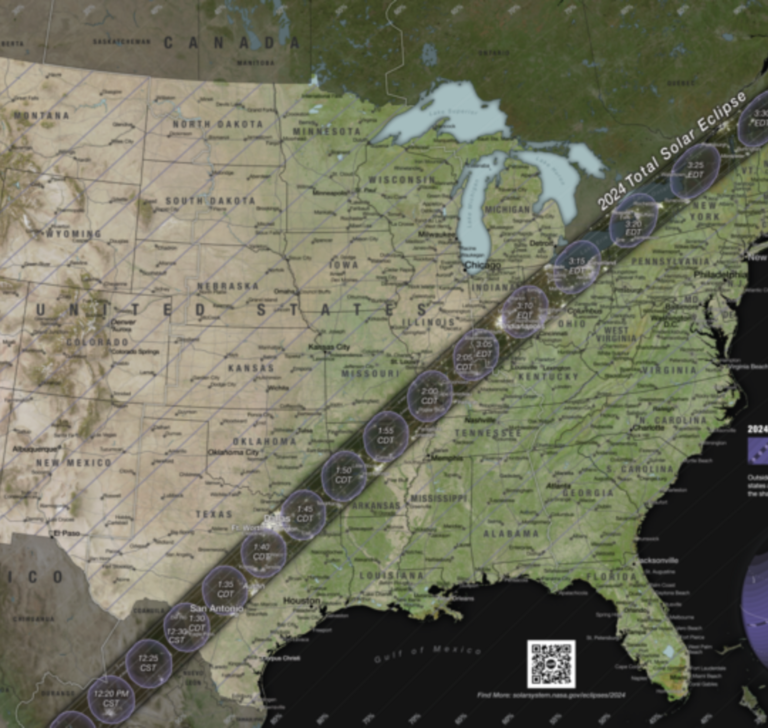Transportation departments urge truckers to consider taking voluntary vacations in the days around April 8 to avoid congestion
On April 8th, a solar eclipse will stretch across the United States, from Maine to Texas. The astronomical event has caused quite a stir among the American population, to the extent that road trips have been planned to witness this astonishing celestial wonder. However, due to the high number of drivers expected on the roads around the time of the event, some state transportation departments recommend that truckers avoid traveling on the roads.
During the last solar eclipse in 2017, millions of people headed to states with better views, causing significant congestion on the roads. Hence, transportation authorities are making efforts to minimize potential traffic jams on major routes of communication. It is estimated that around 3.7 million people will undertake trips to witness the eclipse.
The approximate number of people expected to travel is so high that traffic officials warn that the day could be entirely unproductive for the freight transportation sector. They urge truckers to consider taking voluntary vacations around April 8th to avoid congestion on the roads and main routes.
The Arkansas Department of Transportation forecasts that 1.5 million people will travel to the state to witness the eclipse. Meanwhile, the Indiana Department of Transportation, through a bulletin, asks truckers to complete their loads on April 7th or 9th. Similarly, the Vermont Department of Transportation urges truckers to avoid driving on April 8th and 9th. However, it is unknown how many truckers will take such precautions.

What measures will be taken during the solar eclipse?
Many truckers are reluctant to interrupt their activities due to the eclipse. Gary Langston, president and CEO of the Indiana Trucking Association, argues that freight transportation is a 24/7 operation, and truckers, accustomed to facing various driving conditions, are prepared to deal with the traffic generated by the eclipse without the need to interrupt their activities.
Langston expressed appreciation for the efforts of the Indiana Department of Transportation to find a feasible solution. However, he noted that many truckers might not have the option to avoid traveling on April 8th. Additionally, he added that loads exceeding 200,000 pounds requiring police escorts will not operate during the eclipse.
Transportation departments stressed that all drivers should prepare for eclipse traffic. AAA urged drivers to keep their headlights on and not to stop on the side of the road to view the eclipse, thus avoiding road accidents.
States like Texas and New York have announced emergency plans to have additional resources and anticipate traffic management during the eclipse. Some school districts have decided to close their doors due to the eclipse, citing safety concerns and the expected increase in traffic. And Oklahoma is requesting assistance from the National Guard to provide support during this period.

The story of the first car race in Paris: a historic hit in 1894
Paris stands not only as a cultural and artistic epicenter but also as a pioneer in car racing In the history of automotive racing, Paris

Top states for driving in the United States in 2024
A WalletHub study compared all 50 states to determine the best driving conditions Road safety and quality are central concerns for drivers. And while the

Briefs: marijuana reclassification, vehicle fees, and climate grants
The trucking industry goes through new legislation, taxes and subsidies Questions about the proposed reclassification of marijuana The Owner-Operator Independent Drivers Association (OOIDA) supports the

Impact of traffic pollution: study reveals increase in blood pressure
A study from the University of Washington in Seattle reveals that the main cause of significant increases in blood pressure might be traffic-related gasses A

The benefits and careers of a Commercial Driver’s License
Having a CDL opens multiple doors within the trucking and transportation industry Having a Commercial Driver’s License (CDL) opens multiple doors within the trucking industry,

Sharing the road with a truck: steps to ensure your safety
Caution around blind spots and anticipating truck maneuvers are essential to ensuring everyone’s safety Truck drivers face significant challenges on the road due to their

One Response